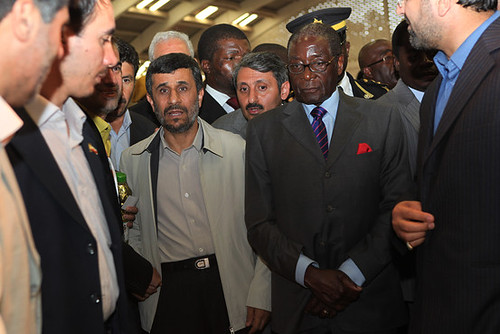
Reports indicate that the Islamic Republic of Iran and the Republic of Zimbabwe will announce a major resource agreement. Pictured here are Presidents Mahmoud Ahmadinejad and Robert Mugabe during a April 2011 visit by the Southern African leader., a photo by Pan-African News Wire File Photos on Flickr.
PANW Editor's Note: This article should be viewed within the context of the consistent attacks carried out over the years against both Zimbabwe and Iran. Since these countries are working closely together, the imperialists will highlight these efforts of South-South anti-imperialist cooperation as being hostile to the interests and security of the western capitalist states.
------------------------------------
Iran's Bid for Africa's Uranium
Western policy makers have an opportunity to make sure Tehran's nuclear machinery keeps running on empty
By ILAN BERMAN
With the drama of the Arab Spring and the death of Osama bin Laden dominating the headlines, you might have missed the most important development in months surrounding Iran's nuclear program: Zimbabwe's emergence as a key enabler of the Islamic Republic's march toward the atomic bomb.
In recent days, officials in Harare have confirmed that the government of Robert Mugabe is finalizing a massive resources deal with Tehran, in defiance of United Nations sanctions aimed at derailing Iran's nuclear push. That agreement, in the works ever since Iranian President Mahmoud Ahmadinejad visited the African state in April 2010, would provide the Iranian regime with preferential access to the country's estimated 455,000 tons of raw uranium over the next five years.
The deal sheds light on what amounts to a major chink in the Islamic Republic's nuclear armor. For all of its atomic bluster, the Iranian regime lacks enough of the critical raw material necessary to independently acquire a nuclear capability. Indeed, according to nonproliferation experts, Iran's known uranium ore reserves are "limited and mostly of poor quality." As a result, it desperately needs steady supplies of uranium ore from abroad. Without them, the Islamic Republic's nuclear plans would, quite simply, grind to a halt.
Iranian President Mahmoud Ahmadinejad, left,and Zimbabwean President Robert Mugabe, during a trade fair in Bulawayo, in April 2010.
.This vulnerability is deepening, moreover. Iran's aging uranium stockpile, which the Islamic Republic acquired from South Africa in the 1970s, is mostly depleted. As a result, Tehran in recent months has been feverishly courting a motley crew of foreign partners in search of new and stable sources of uranium to fuel its nuclear habit. According to a confidential intelligence summary from an unnamed International Atomic Energy Agency (IAEA) member state this past February, the Islamic Republic has focused on Africa, home to a number of key uranium producers including Zimbabwe, Senegal, Nigeria and the Democratic Republic of Congo.
Tehran's procurement patterns offer a major opportunity for the West. Over the years, Washington and its European allies have worked feverishly to prevent Iran's acquisition of the technology needed for its nuclear program, with only limited success. Today, despite numerous covert initiatives ranging from the promulgation of deliberately faulty designs to the sabotage of critical materials, the IAEA currently estimates Iran to have some 11,000 operational centrifuges and a stockpile of more than two tons of low-enriched uranium—a sufficient quantity, nuclear scientists say, to build more than one nuclear weapon if it is refined further.
Other efforts have likewise had only limited impact. Even Stuxnet, the mysterious computer worm that ravaged Iran's nuclear-control systems between mid-2009 and late 2010, is by now largely a spent force. The Institute for Science and International Security, a Washington-based nonproliferation think tank, estimates that at the height of its effectiveness, the malicious software destroyed just over 10% of the 9,000 uranium enrichment centrifuges at Iran's Natanz facility, and that the virus "is unlikely to destroy more."
Comparatively little attention, however, has been paid to the critical fuel necessary for Iran's nuclear progress. Over the past three years, Western chancelleries have marshaled considerable diplomatic efforts to dissuade potential uranium suppliers such as Kazakhstan, Uzbekistan and Brazil from providing Tehran the raw material needed for its nuclear program. For all of their concern, however, Washington policy makers have not yet given serious thought to penalizing countries for their uranium sales to Iran, or crafted a legislative framework that makes it possible to do so.
They should. By identifying and then punishing Tehran's current suppliers of uranium ore, the U.S. and its allies can slow its acquisition of the raw material necessary to realize its nuclear ambitions—and send a clear signal to potential future sources of uranium for Iran's atomic effort, like Zimbabwe, that their involvement with the Islamic Republic's nuclear program will come at a steep economic and political cost.
In its ongoing bid to derail Iran's nuclear drive, Capitol Hill is now said to be contemplating new sanctions aimed at further tightening the international noose around Tehran. Iran's flirtation with Zimbabwe strongly suggests that lawmakers would do well to focus less on trying to stop Iran's centrifuges from spinning and more on making sure that Iran's nuclear machinery is running on empty.
—Mr. Berman is vice president of the American Foreign Policy Council in Washington, D.C. This article is adapted from his essay in the forthcoming Summer 2011 edition of the Middle East Quarterly.
Copyright 2011 Dow Jones & Company, Inc. All Rights Reserved
No comments:
Post a Comment